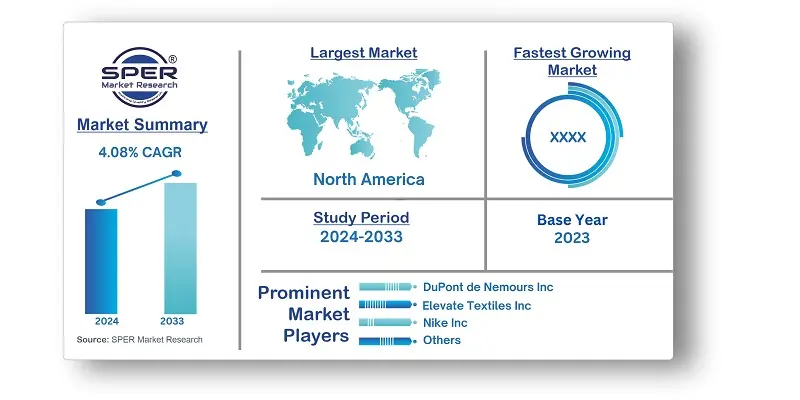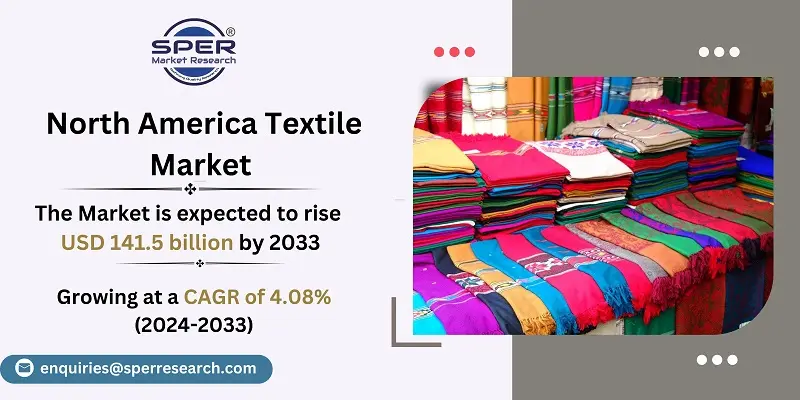
North America Textile Market Growth, Size, Trends, Demand, Share, Revenue and Future Outlook
North America Textile Market Size- By Application, By Material Type, By Process- Regional Outlook, Competitive Strategies and Segment Forecast to 2033
| Published: May-2024 | Report ID: FMCG24108 | Pages: 1 - 155 | Formats*: |
| Category : Consumer & Retail | |||
- In February 2023: SK Capital Partners' portfolio business Archroma acquired the Textile Effects subsidiary of Huntsman Corporation (NYSE: HUN). The purchase price that was agreed upon was USD 593 million, which included assumed pension liabilities in cash. Prior to the usual post-closing adjustments, Huntsman projects the net after-tax cash proceeds to be roughly USD 540 million.
- December 2022: To increase bilateral trade, Canada and India are negotiating a free trade agreement (FTA). The Indian textile sector has proposed a number of agreement-related regulations. If the planned Free Trade Agreement (FTA) would lead to an increase in export orders will depend on its terms. India exports very little clothing to Canada at the moment.


| Report Metric | Details |
| Market size available for years | 2020-2033 |
| Base year considered | 2023 |
| Forecast period | 2024-2033 |
| Segments covered | By Application, By Material Type, By Process |
| Regions covered | United States, Canada, Mexico |
| Companies Covered | American Eagle Outfitters Inc., DuPont de Nemours Inc., Elevate Textiles Inc., Guilford Mills Inc., Hennes & Mauritz AB, Levi Strauss & Co., Mohawk Industries Inc., Nike Inc., Standard Textile Co. Inc., The Dixie Group Inc., Welspun India Ltd, WestPoint Home Inc. |
- Fashion Retailers
- Apparel Manufacturers
- Interior Designers
- Home Furnishing Brands
- Industrial Buyers
- Textile Wholesalers
- Fashion Designers
| By Application: |
|
| By Material Type: |
|
| By Process: |
|
- North America Textile Market Size (FY’2024-FY’2033)
- Overview of North America Textile Market
- Segmentation of North America Textile Market By Application (Clothing, Industrial/Technical Applications, Household Applications)
- Segmentation of North America Textile Market By Material Type (Cotton, Jute, Silk, Synthetics, Wool)
- Segmentation of North America Textile Market By Process (Woven, Non-woven)
- Expansion Analysis of North America Textile Market
- Problems and Obstacles in North America Textile Market
- Competitive Landscape in the North America Textile Market
- Impact of COVID-19 and Demonetization on North America Textile Market
- Details on Current Investment in North America Textile Market
- Competitive Analysis of North America Textile Market
- Prominent Players in the North America Textile Market
- SWOT Analysis of North America Textile Market
- North America Textile Market Future Outlook and Projections (FY’2024-FY’2033)
- Recommendations from Analyst
1.1. Scope of the report1.2. Market segment analysis
2.1. Research data source2.1.1. Secondary Data2.1.2. Primary Data2.1.3. SPER’s internal database2.1.4. Premium insight from KOL’s2.2. Market size estimation2.2.1. Top-down and Bottom-up approach2.3. Data triangulation
4.1. Driver, Restraint, Opportunity and Challenges analysis4.1.1. Drivers4.1.2. Restraints4.1.3. Opportunities4.1.4. Challenges4.2. COVID-19 Impacts of the North America Textile Market
5.1. SWOT Analysis5.1.1. Strengths5.1.2. Weaknesses5.1.3. Opportunities5.1.4. Threats5.2. PESTEL Analysis5.2.1. Political Landscape5.2.2. Economic Landscape5.2.3. Social Landscape5.2.4. Technological Landscape5.2.5. Environmental Landscape5.2.6. Legal Landscape5.3. PORTER’s Five Forces5.3.1. Bargaining power of suppliers5.3.2. Bargaining power of buyers5.3.3. Threat of Substitute5.3.4. Threat of new entrant5.3.5. Competitive rivalry5.4. Heat Map Analysis
6.1. North America Textile Market Manufacturing Base Distribution, Sales Area, Product Type6.2. Mergers & Acquisitions, Partnerships, Product Launch, and Collaboration in North America Textile Market
7.1. North America Textile Market Size, Share and Forecast, By Application, 2020-20267.2. North America Textile Market Size, Share and Forecast, By Application, 2027-20337.3. Clothing7.4. Industrial/Technical Applications7.5. Household Applications
8.1. North America Textile Market Size, Share and Forecast, By Material Type, 2020-20268.2. North America Textile Market Size, Share and Forecast, By Material Type, 2027-20338.3. Cotton8.4. Jute8.5. Silk8.6. Synthetics8.7. Wool
9.1. North America Textile Market Size, Share and Forecast, By Process, 2020-20269.2. North America Textile Market Size, Share and Forecast, By Process, 2027-20339.3. Woven9.4. Non-woven
10.1. North America Textile Market Size and Market Share
11.1. North America Textile Market Size and Market Share By Region (2020-2026)11.2. North America Textile Market Size and Market Share By Region (2027-2033)11.3. United States11.4. Canada11.5. Mexico
12.1. American Eagle Outfitters Inc.12.1.1. Company details12.1.2. Financial outlook12.1.3. Product summary12.1.4. Recent developments12.2. DuPont de Nemours Inc.12.2.1. Company details12.2.2. Financial outlook12.2.3. Product summary12.2.4. Recent developments12.3. Elevate Textiles Inc12.3.1. Company details12.3.2. Financial outlook12.3.3. Product summary12.3.4. Recent developments12.4. Guilford Mills Inc.12.4.1. Company details12.4.2. Financial outlook12.4.3. Product summary12.4.4. Recent developments12.5. Hennes & Mauritz AB12.5.1. Company details12.5.2. Financial outlook12.5.3. Product summary12.5.4. Recent developments12.6. Levi Strauss & Co.12.6.1. Company details12.6.2. Financial outlook12.6.3. Product summary12.6.4. Recent developments12.7. Mohawk Industries Inc.12.7.1. Company details12.7.2. Financial outlook12.7.3. Product summary12.7.4. Recent developments12.8. Nike Inc.12.8.1. Company details12.8.2. Financial outlook12.8.3. Product summary12.8.4. Recent developments12.9. Standard Textile Co. Inc.12.9.1. Company details12.9.2. Financial outlook12.9.3. Product summary12.9.4. Recent developments12.10. The Dixie Group Inc.12.10.1. Company details12.10.2. Financial outlook12.10.3. Product summary12.10.4. Recent developments12.11. Welspun India Ltd12.11.1. Company details12.11.2. Financial outlook12.11.3. Product summary12.11.4. Recent developments12.12. WestPoint Home Inc.12.12.1. Company details12.12.2. Financial outlook12.12.3. Product summary12.12.4. Recent developments12.13. Others
SPER Market Research’s methodology uses great emphasis on primary research to ensure that the market intelligence insights are up to date, reliable and accurate. Primary interviews are done with players involved in each phase of a supply chain to analyze the market forecasting. The secondary research method is used to help you fully understand how the future markets and the spending patterns look likes.
The report is based on in-depth qualitative and quantitative analysis of the Product Market. The quantitative analysis involves the application of various projection and sampling techniques. The qualitative analysis involves primary interviews, surveys, and vendor briefings. The data gathered as a result of these processes are validated through experts opinion. Our research methodology entails an ideal mixture of primary and secondary initiatives.



Frequently Asked Questions About This Report
PLACE AN ORDER
Year End Discount
Sample Report
Pre-Purchase Inquiry
NEED CUSTOMIZATION?
Request CustomizationCALL OR EMAIL US
100% Secure Payment






Related Reports
Our Global Clients
Our data-driven insights have influenced the strategy of 200+ reputed companies across the globe.




















